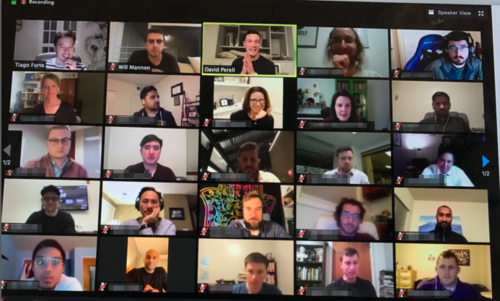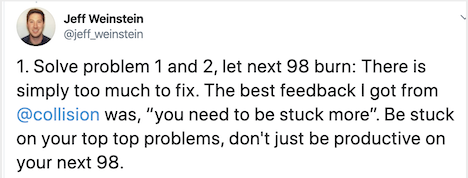“What makes people feel human in the inhuman context of the internet?” Our Write of Passage improvement efforts have focused on one area. A recent Tweet by Jeff Weinstein, a product lead at Stripe, provides some guidance: My problem #1 to solve for Write of Passage is strengthening the student community. Write of Passage attractsRead…

“What makes people feel human in the inhuman context of the internet?”
Our Write of Passage improvement efforts have focused on one area. A recent Tweet by Jeff Weinstein, a product lead at Stripe, provides some guidance:

My problem #1 to solve for Write of Passage is strengthening the student community.
Write of Passage attracts an impressive group. In Cohort 3 (November – December) we had 178 students from 28 different countries. People of all ages and industries joined together for five weeks of online writing. Given the quality of our students, I know that future friends, coauthors, even business partners are just a few conversations away. As course manager, it’s my job to help make those connections happen.
Right now, the way students meet isn’t good enough.
Students currently connect in a few places. We hold class (via Zoom video conferencing) on Monday and Wednesday evenings, US time. During the 90 minute sessions you can meet fellow classmates through breakout rooms, which are small group chats of 2-4 students that are assigned randomly each class. We also encourage students to chat in the community forum. In Cohort 3 the forum was well-used for submitting weekly assignments, but the “General Discussion” section was noticeably quiet. We used software called Discourse to host our platform which has a clunky user interface. Students had more success talking on Twitter, but not everyone in the class is an active tweeter.
Our post-course survey and feedback calls had a clear theme. Students found the course valuable, but they want more chances to meet other classmates. Sure, David and I encourage people to reach out directly after breakout rooms, or when someone’s article really resonates. But we’re still in the early days of online communities. Virtual outreach can feel awkward and uncomfortable, even if you’ve already talked briefly.
We expect up to 200 students in Cohort 4. There’s no way to get to know that many people in five weeks. When that many students post their intros or article drafts on the public forum, there’s far too many for any one student to read. In the past, new Write of Passage students have felt anonymous amongst a group of strangers scattered around the world. While students did build stronger relationships as the course went on, we want to compress the get-to-know-you phase from five weeks to five days. We want people to feel welcome quickly.
So what’s the answer? How will we design the course in Cohort 4 to improve student interactions? Over the past few weeks I’ve been working on a plan. It started with five items, then eight, now nine. I won’t address everything here, but one key idea is to make a big class feel small.
Enter feedback groups.
In Cohort 4, instead of submitting your article drafts to a public section of the forum, you’ll share it with a small private group (~10 students). This will be your tribe, the team that you stick with through all five weeks of the course. Writing feedback and assignment submission will happen at the group level. Members will have the chance to get to know their group personally, through critiquing each others’ work, and chatting in a special small-group section of our new forum.
Specific ideas to spark digital friendships include: post a 100-200 word introduction the first day; attend a feedback group Zoom call during “Initiation Week”; share your writing and publishing goals. Another idea is to ask returning alumni to share a photo of themselves from outside of class. Hopefully others will then follow their lead. Sharing a picture of family, a pet, or a favorite hobby could help classmates to see each others’ human side, and maybe discover overlapping interests. It’s a difficult balance, because we don’t want exercises to feel silly or forced, like a bad first day at summer camp. We want to push people just the right amount, and let relationships build naturally the rest of the way.
Building real camaraderie online is challenging. Everyone knows how to bond with someone in person. The ritual of a handshake and opening chitchat (Where are you from? And what do you do?) are beyond familiar. We start to absorb these social patterns as kids, and begin performing them ourselves as young teenagers.
The same norms don’t exist for online courses. There may be common practices on forums or Reddit threads, but many of our students don’t spend time in those places. We have tech folks enroll, but also digital novice Boomers. Most students are taking their first online course. Most have never started a friendship on the internet. I’ve talked with Hannah, a past student who is helping build the WOP community, about how to bring out the human element to overcome these obstacles. We think small private communities will help.
Feedback groups are important, but they’re just one of nine changes we’re introducing. I’ll share more about other parts of the plan in the coming weeks. There are no easy fixes here. Building a tight-knit student body over fiber wires and copper cables is a new challenge, and we’ll continue to learn as we go. But making a big class small through feedback groups is a good start.
Written by Will Mannon. Originally published on his website.


